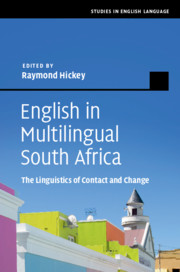Book contents
- English in Multilingual South Africa
- Studies in English Language
- English in Multilingual South Africa
- Copyright page
- Contents
- Figures
- Maps
- Tables
- Contributors
- Preface
- I A Framework for English in South Africa
- II Sociolinguistics, Globalisation and Multilingualism
- Chapter 7 Language Contact in Cape Town
- Chapter 8 Internal Push, External Pull: The Reverse Short Front Vowel Shift in South African English
- Chapter 9 Youth Language in South Africa: The Role of English in South African Tsotsitaals
- Chapter 10 Econo-Language Planning and Transformation in South Africa: From Localisation to Globalisation
- Chapter 11 Multilingualism in South African Education: A Southern Perspective
- III Language Interfaces
- Timeline for South African History
- Glossary
- Index
- References
Chapter 7 - Language Contact in Cape Town
from II - Sociolinguistics, Globalisation and Multilingualism
Published online by Cambridge University Press: 07 November 2019
- English in Multilingual South Africa
- Studies in English Language
- English in Multilingual South Africa
- Copyright page
- Contents
- Figures
- Maps
- Tables
- Contributors
- Preface
- I A Framework for English in South Africa
- II Sociolinguistics, Globalisation and Multilingualism
- Chapter 7 Language Contact in Cape Town
- Chapter 8 Internal Push, External Pull: The Reverse Short Front Vowel Shift in South African English
- Chapter 9 Youth Language in South Africa: The Role of English in South African Tsotsitaals
- Chapter 10 Econo-Language Planning and Transformation in South Africa: From Localisation to Globalisation
- Chapter 11 Multilingualism in South African Education: A Southern Perspective
- III Language Interfaces
- Timeline for South African History
- Glossary
- Index
- References
Summary
In this chapter, using historical records and academic commentaries and research, we trace language contact in Cape Town from as far back as 400 CE. We detail how people indigenous to the area, as well as migrants from the rest of Africa and abroad, adapted their speech for social, political and economic reasons, with the result that Dutch, and later Afrikaans and English, gained prominence. After this diachronic account, we focus on two contemporary speech communities in Cape Town, and through interviews and participant observations confirm that while English is considered a prestige language and the key to future success, people still speak vernacular varieties of their own languages and of English. Examination of the linguistic landscape of the city in a number of research articles shows that English (some of it non-standard) is used far more widely in signage than African languages, which are used primarily for stylistic and affective reasons. Finally, we use research into hip-hop and rap performances in the city to argue that in this domain of music, local languages and mixed codes are preferred over English.
Keywords
- Type
- Chapter
- Information
- English in Multilingual South AfricaThe Linguistics of Contact and Change, pp. 129 - 150Publisher: Cambridge University PressPrint publication year: 2019

